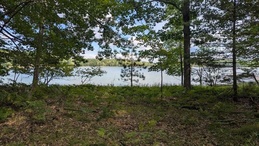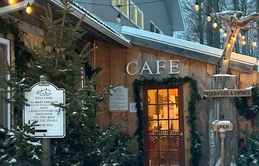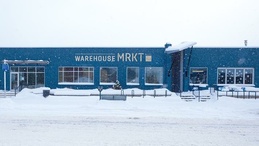Journey to Iraq
Nov. 8, 2009
Journey to IraqAverage citizen Bill Murphy reached out to victims of the war
By Robert Downes • Photos by Bill Murphy 11/9/09
Bill Murphy is not a soldier, a missionary or a diplomat; he is, in fact, a specialist in decorative painting who lives in a condo just west of Traverse City. But when he was offered a chance to lend a hand in one of the most devastated regions of Iraq as an ordinary citizen, he leapt at the opportunity.
Last spring, Bill joined members of a relief group called Iraqi Health Now to help transport a 40-foot container of medical supplies and water filters to Basra, a city in the southern part of Iraq that has been ruined by years of warfare.
He accompanied Haider Alsaedy, a native Iraqi who now lives in Kalamazoo. Back in the 1990s, Haider had spent eight years in a refugee camp in Saudi Arabia, fleeing the wrath of dictator Saddam Hussein. Sixteen years after leaving his home town, Haider returned to find the infrastructure of Basra destroyed, with the streets full of garbage and sewage. The marshes around town had been drained and the local hospitals lacked the most basic supplies -- patients were even sharing syringes. There was little electricity and no clean water anywhere in the region.
Haider returned to his new home in the U.S. to seek the help of the Michigan/Ohio Chapter of Iraqi Health Now to bring medical supplies to Basra.
Thus, last April and March, Murphy, 59, found himself with Haider, living in a bleak desert village full of jobless men, delivering water filters to people whose freshwater has been fouled by bacteria, pollution, salt and radiation. He also found himself creating a documentary on the needs of the Iraqi people as a one-man film crew.
“I had the option of staying at a four-star hotel in the city with 24/7 protection, but I wanted to stay in the village,” Murphy recalls. “So I lived in that community with Haider’s friends. I was ‘one of the gang’ and they knew I was there to help out. The men of the village came around and told me that if any harm came in my direction, someone would have to walk over their dead bodies to get me. They respected me, loved me, and treated me like family.”
THE SITUATION
Basra is a city that lies between the Tigris and Euphrates rivers in what is known as the Cradle of Civilization. At one time, the area was so full of life and vitality that it inspired the biblical story of the Garden of Eden. Prior to the first Gulf War, the freshwater marshes around Basra supported a fishing industry and provided reeds to build homes and for making baskets.
When the first Gulf War took place in the early ’90s, the Shi’ite people of southern Iraq rose up against Saddam Hussein. At the time, they believed that U.S. troops under the first President George Bush, Sr., would join them in their revolt.
“Our troops were still there when the Shi’a staged their revolution against Saddam, but we didn’t back them,” Murphy says. “The revolt pissed off Saddam and he did whatever it took to get back at them while American troops did nothing to stop him.”
After the U.S. pulled out of southern Iraq at the end of Operation Desert Storm, Saddam Hussein’s troops moved in and began a reign of terror that included destroying the homeland of his Shi’ite enemies -- including the marshes of the area which hid guerrilla fighters.
“A lot of the Shi’ites lived in the marshes down south, and Saddam went in and built channels to divert the water out of there... He even brought in huge pumps.”
At the same time, Murphy says, the region was undergoing several years of drought. To compound matters, Turkey had thrown dams across the rivers far to the north.
“As a result of all this, the salt water of the Persian Gulf flooded these drained marshes and replaced all of the fresh water,” Murphy says. “It drastically changed the way that life has gone on here for thousands of years.”
The new Iraq war that began in 2003 added to the misery. Water purification plants, roads and electrical power stations were destroyed. Today, unemployment runs 50-60 percent. And the region is hot with radioactive dust from the residue of depleted uranium bombs dropped by the U.S. and British forces.
“The cancer rate there has gone way up because of our bombs made from depleted uranium,” Murphy says. “Kids are playing in fields full of radiation. People are breathing it in the air and ingesting God knows what -- we won’t know the full extent of the damage for years.”
BILL’S STORY
Murphy is no stranger to a life of risk. Born and raised in Southfield, he volunteered for the U.S. Marines in 1969 after his 19-year-old brother Patrick was killed in a mortar attack in Vietnam on Valentine’s Day in 1968. He served in the Marines until 1971, first in the infantry, and then with a recon unit.
After the service, he spent six years bumming around the U.S., Canada, Mexico and Central America in a Volkswagen van, working odd jobs and following the construction boom from place to place.
In the 1980s, he attended film school and spent three years in Charleston, South Carolina, working on documentaries, docu-dramas and low-budget films. Unfortunately, Hurricane Hugo literally turned his life there upside down, sweeping his beachfront home into the sea. “All that was left after the hurricane struck was an afghan my mother had knitted that was wrapped around a shattered palm tree and a coffee cup,” he recalls. “Those were the only two things I salvaged.”
Thereafter, Murphy fell in love with a woman from Colombia. They married and moved to her home in South America, where he established a decorative painting business.
Certified by London City & Guilds to work in some of the most prestigious historical homes in the world, Murphy is an expert in specialty finishes, including exquisite marbling and woodgraining that are impossible to tell from the real thing. He’s served as a craftsman at the Biltmore Estates in Asheville, North Carolina.
In Colombia, he put his skills to work on the homes of drug lords and coffee magnates. “I’d say that 95 percent of my work was with the mafia,” he says.
The Colombians especially loved the rich, deep blues of lapis lazuli; one drug kingpin even requested skeins of pure gold embedded in the blue wall of his home -- like the colors of a Chagall painting. Murphy recalls one home having three armed guards -- two guys with pistols and a third out in the garage with a submachine gun. Nice guys who would make him sandwiches while he was working.
MOVING ON
Ultimately, that too came to an end. Murphy and his wife moved to California where they divorced. He’s still in touch with his step sons Alex and Daniel, and his eyes light up with pride when he describes their successful careers in the U.S.
So what brought him to Northern Michigan?
Back in 1968, his brother Mike bought the The Riverside Inn in Leland. “I spent the summer here helping him open up the place before joining the Marines and my family gradually trickled up here,” he says. “Through the years, Traverse City became like a home base for me.”
Meanwhile, Murphy’s sister Kathy had joined Iraqi Health Now as a coordinator for the Michigan/Ohio Chapter. The organization’s goal is to raise medical supplies for the hospitals of Iraq.
“I was visiting my sister Kathy and she was talking about sending another container of supplies over there,” Murphy recalls. “I said, Kathy, I’d love to go there. I’d love to film it and make some sort of documentary.”
It cost between $7,000-$10,000 to ship a 40-foot container to Iraq by way of Kuwait. The unit was packed with surgical kits, medical supplies, clothing, wheelchairs, crutches, walkers and water purification kits.
One crying need included 160 Hydraid bio-sand water filters used to purify the filthy, bacteria-filled water of the villages.
“There are two million to two-and-a-half million people living in Basra and they have a water treatment plant there, but it’s not up and running,” Murphy says. “They need a desalination plant too, because their water is contaminated with salt.”
Because the sand of the region is contaminated with radiation, Murphy’s team also had to bring their own special blend of sand and gravel from California to stock the water filters. “The filters don’t remove the salt from the water, but they do make it 99.9 percent bacteria-free,” he says.
GETTING THERE
But even though they were on a humanitarian mission, Murphy says that they were shook down for money at every step of their trip. One fee was jacked up from $300 to $700 to transport their container from Kuwait to Iraq, and then additional fees were demanded in order to cross the border and for the journey on to Basra.
“I saw a lot of greed and corruption there,” he says. “It’s like the carpet baggers who moved into the South after the Civil War. The people in power hire their friends and relatives to do the work of reconstruction, and they’re usually not the most qualified to do the job. So there’s a lot of money going to waste there, plus, the people in power are lining their own pockets.”
At one point, Murphy lost his cool and raged at authorities for shaking down the humanitarian mission for more money. On another occasion, a laughing young Iraqi soldier stuck a .45 in his face and waved it back and forth. Murphy gently grabbed his hand and pulled the pistol away.
“He was just a kid goofing around, being a clown. I knew he wasn’t going to kill me, but it scared the hell out of me, because it was a loaded gun, and you never know. He was lucky there were no U.S. military around, or I would have had his blood splattered all over me.”
In addition to corruption and mismanagement, Iraqi victims of the war are also passed over by other priorities:
“I saw roads and bridges being built there, while their hospitals were still in need. But why are they doing that? So they can move the oil around to market. They should be getting the people healthy there instead.”
In the village, Murphy took 800 photos and shot 17 hours of video. He plans to create a 15-20 minute documentary to upload on the www.iraqihealthnow.org website to help the cause.
Does he believe America has a responsibility to help rebuild Iraq?
“At least the portion that we destroyed,” he says.
“Typically, you go to war and have a game plan if you’re the president or commander in chief. It’s not just about troops and artillery and jets. You need to send the Seabees (Construction Battalions) in to build roads and hospitals and get the electricity back on and the traffic lights working again; but we didn’t do any of that.”
So, what do the people of America need to know about the people they have liberated -- and forgotten -- in Iraq?
“They’re people just like us,” Murphy says. “Of course, they have a different religion, which I don’t agree with -- they’re very different from us in some ways. But they’re also just like us in many other ways, with the same feelings.”
Check out www.iraqihealthnow.org if you’d like to make a donation or provide medical supplies for the hospitals of Iraq. To see examples of Murphy’s marbling, wood-graining and Old World finishes, contact him at llibmurphy1@hotmail.com.
Trending

Welcoming the Winter Solstice: Rituals & Events for the Shortest Day of the Year
With the winter solstice quickly approaching, it’s hard not to notice how dark each day feels. Astronomically, this is… Read More >>
Camp Greilick Now Open!
It’s been a long road for the century-old Camp Greilick, which, after several dormant years, was acquired by Grand Tra… Read More >>
Men and Ugly Sweaters
Those two things don’t always go together, but on Dec. 19, you’ll see both out and about in Petoskey and Harbor … Read More >>


